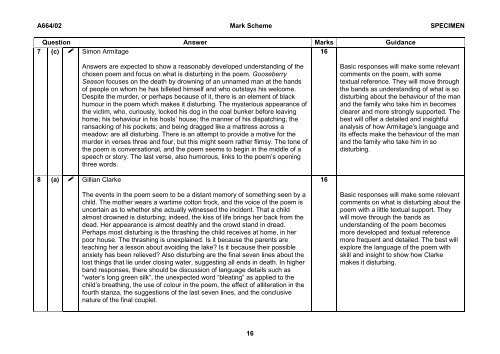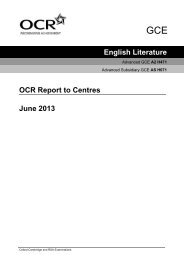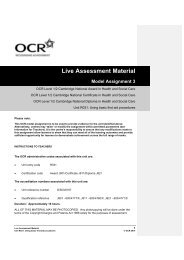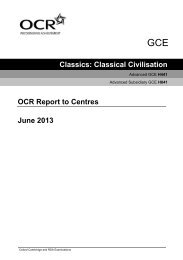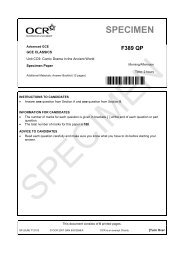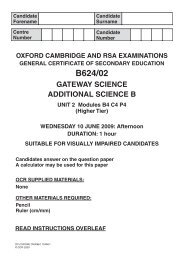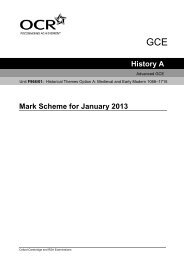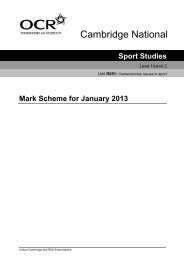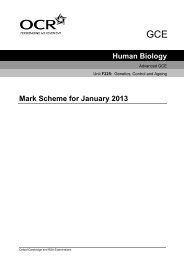Higher - From September 2013 - Specimen - OCR
Higher - From September 2013 - Specimen - OCR
Higher - From September 2013 - Specimen - OCR
Create successful ePaper yourself
Turn your PDF publications into a flip-book with our unique Google optimized e-Paper software.
A664/02 Mark Scheme SPECIMEN<br />
Question Answer Marks Guidance<br />
7 (c) Simon Armitage<br />
16<br />
Answers are expected to show a reasonably developed understanding of the<br />
chosen poem and focus on what is disturbing in the poem. Gooseberry<br />
Season focuses on the death by drowning of an unnamed man at the hands<br />
of people on whom he has billeted himself and who outstays his welcome.<br />
Despite the murder, or perhaps because of it, there is an element of black<br />
humour in the poem which makes it disturbing. The mysterious appearance of<br />
the victim, who, curiously, locked his dog in the coal bunker before leaving<br />
home; his behaviour in his hosts’ house; the manner of his dispatching; the<br />
ransacking of his pockets; and being dragged like a mattress across a<br />
meadow: are all disturbing. There is an attempt to provide a motive for the<br />
murder in verses three and four, but this might seem rather flimsy. The tone of<br />
the poem is conversational, and the poem seems to begin in the middle of a<br />
speech or story. The last verse, also humorous, links to the poem’s opening<br />
three words.<br />
Basic responses will make some relevant<br />
comments on the poem, with some<br />
textual reference. They will move through<br />
the bands as understanding of what is so<br />
disturbing about the behaviour of the man<br />
and the family who take him in becomes<br />
clearer and more strongly supported. The<br />
best will offer a detailed and insightful<br />
analysis of how Armitage’s language and<br />
its effects make the behaviour of the man<br />
and the family who take him in so<br />
disturbing.<br />
8 (a) Gillian Clarke<br />
16<br />
The events in the poem seem to be a distant memory of something seen by a<br />
child. The mother wears a wartime cotton frock, and the voice of the poem is<br />
uncertain as to whether she actually witnessed the incident. That a child<br />
almost drowned is disturbing; indeed, the kiss of life brings her back from the<br />
dead. Her appearance is almost deathly and the crowd stand in dread.<br />
Perhaps most disturbing is the thrashing the child receives at home, in her<br />
poor house. The thrashing is unexplained. Is it because the parents are<br />
teaching her a lesson about avoiding the lake? Is it because their possible<br />
anxiety has been relieved? Also disturbing are the final seven lines about the<br />
lost things that lie under closing water, suggesting all ends in death. In higher<br />
band responses, there should be discussion of language details such as<br />
“water’s long green silk”, the unexpected word “bleating” as applied to the<br />
child’s breathing, the use of colour in the poem, the effect of alliteration in the<br />
fourth stanza, the suggestions of the last seven lines, and the conclusive<br />
nature of the final couplet.<br />
Basic responses will make some relevant<br />
comments on what is disturbing about the<br />
poem with a little textual support. They<br />
will move through the bands as<br />
understanding of the poem becomes<br />
more developed and textual reference<br />
more frequent and detailed. The best will<br />
explore the language of the poem with<br />
skill and insight to show how Clarke<br />
makes it disturbing.<br />
16


